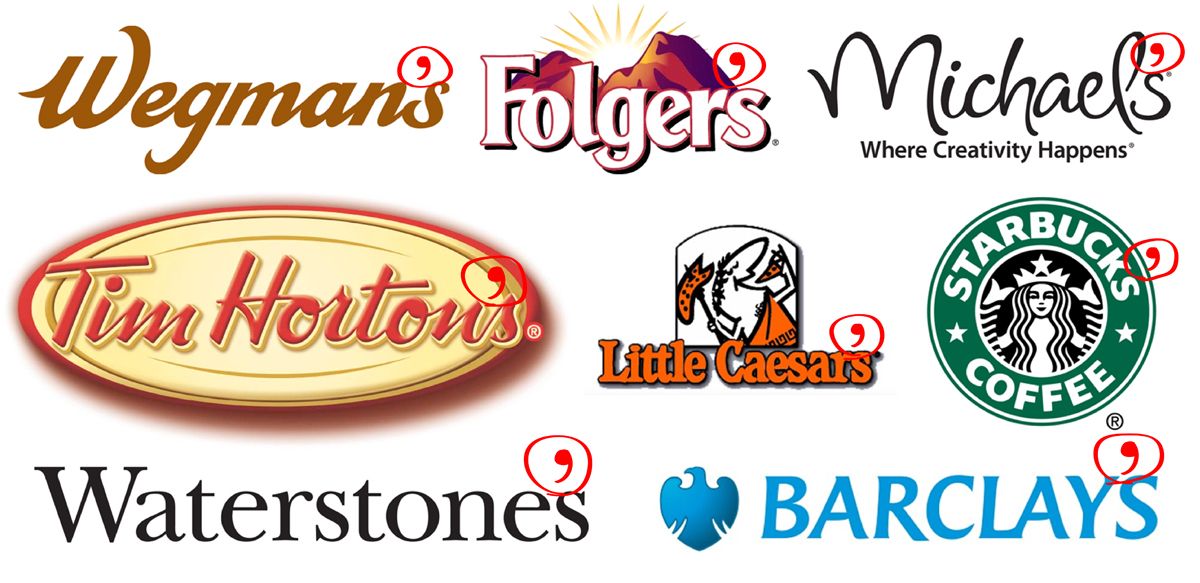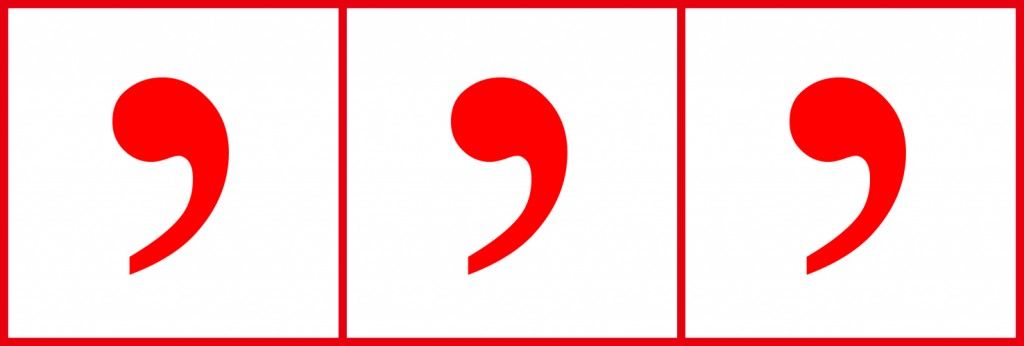I think we all know (or should know) the fundamental rule : when something belongs to someone, his or her name gets an apostrophe just before the “s” in the respective statement. A few examples: Luke Skywalker’s lightsaber, Annie Leibovitz’s camera, Ace Ventura’s affinity for animals, Heisenberg’s secret identity. You get the idea.
But the possessive apostrophe has long been missing from a number of big name brands. Why on earth would they leave such a minute mark out of their names?
Let it be clear that I’m not writing this post to bash any brands. I realize that grammatically flawed brand names are nothing new. And if anything, I can appreciate the finer strategies behind branding, as I work in the marketing industry myself. My intention is to get down to the bottom of this strange aversion to grammatical accuracy and satisfy a longstanding curiosity of mine. So here we go…
Does It Depend on Who the Brand Is Named After?
It’s important to start by stepping into the respective brands’ shoes, approaching the question on a case-by-case basis. After all, big corporations can be pretty complicated and vary greatly from one to the next.
Let’s start with brands that take their names from fictional characters. Companies such as Starbucks and Little Caesars are missing apostrophes, despite clearly being named after a particular figure. The “Little Caesar” name came from co-owner Marian Ilitch’s endearing pet name for her husband Michael, and an illustrated character was created to represent and promote their brand name. Similarly, Starbucks borrowed its name from the fictional first mate of the whaling ship Pequod in Moby Dick. In both cases, there’s a singular figure marketing the brand, so the inclusion of a possessive apostrophe should have theoretically been a no-brainer.
Next we’ll move on to those that were named after a person of the past. In these cases, perhaps their logic behind lacking the possessive apostrophe lies in the fact that their namesakes are long gone. For brands such as Tim Hortons and Barclays, this is true; Mr. Horton died in a car crash in 1974, and the Barclay family lost its role in the bank several centuries ago. But killing the apostrophe doesn’t solve the problem. Instead, the brand name is transformed from possessive to plural, indicating that there are several Hortons and Barclays behind each company’s operations. But… there aren’t, because they’re dead.
So how about those brands that are currently owned or operated by their founding individuals or families? We’ll focus on Wegmans, since they’re one of the few brands to openly address the issue of their absent possessive apostrophe.
A popular grocery chain in the Eastern US, Wegmans was founded in the early 20th century by brothers John and Walter Wegman, and it’s currently in its third generation of family ownership. The website explains they’ve been without an apostrophe since 1931, after the company incorporated and “simplified” their logo. They legitimize the missing punctuation through the multiple generations of Wegman family ownership (and the fact that the company’s CEO, president and vice president of restaurant operations are all related).
This excuse does technically negate the need for a possessive apostrophe, but the successive generations of Wegman management certainly wouldn’t make the initial apostrophe incorrect. So what reason could a brand have to abolish it?
A Method to the Madness
There are a few practical reasons why brands choose to avoid adding an apostrophe to their names. The choice usually has to do with the size of the company, how they brand themselves and where they market their products or services.
The first stems from financial obligations. When a large brand decides to redesign their logo or rebrand their name, it can potentially cost millions of dollars. This was true in Wegmans’ case, and it’s another reason they explicitly cite for avoiding the addition of an apostrophe. If a national brand like Folgers or Michaels chose to do the same, they’d have to alter the designs on all of their product lines and signage to reflect the change and keep their branding universally consistent.
Rebranding in any degree is a very slow and tedious process, and the decision should never be taken lightly. As I mentioned earlier, it depends on what the company does and how they market themselves. Rebranding a brick-and-mortar based operation (such as a restaurant or retail chain) can be a far more costly undertaking than an exclusively e-commerce business.
Having diagnosed the existence of longtime apostrophe-less names, it’s time to move onto those who’ve recently abolished proper grammar.
One predominant reason for this sort of rebranding in recent years has been the shift to e-commerce, and the significant role the Internet now plays in marketing. Thinking back to the dot-com boom of the late ’90s, many brand names embraced the “.com” suffix by adding it to their official name. Of course, URLs don’t allow for apostrophe use, and consumers have become accustomed to the exclusion of such punctuation when seeking a business on the Web.
This ideology has led many businesses to rebrand for what they often describe as a more “versatile” and Internet-friendly presence. Many of the big players are bracing themselves for the influence of an Internet that’ll be booming for the foreseeable future.
Search engine optimization can weigh heavily on how a company performs online, and more companies are changing the punctuation of their names to better compete in the search engines.
When searched on Google or Bing, terms with apostrophes sometimes generate different results than ones without them. The extent of the SERP differences can depend on the word and size of the brand name being searched. For one, there tends to be far more competition on the keywords without apostrophes, so it’s in these brands’ best interests to rank under those search terms. This way they’re not missing out on potentially big traffic to their site when contemporary users leave out possessive apostrophes in their searches.
So there we have it; brands that never had the proper apostrophe won’t add it because it’s too expensive, and brands that get rid of it do so to mesh better with the digital age and please search engines.
But do you think this popular lack of apostrophe is admissible? Does ease of branding and a possible leg up in the search engines make it okay to disregard the rules of the English language? Let us know in the comments.




